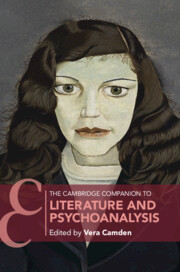Book contents
- The Cambridge Companion to Literature and Psychoanalysis
- The Cambridge Companion to Literature and Psychoanalysis
- Copyright page
- Contents
- Figures
- Abbreviations
- Contributors
- Acknowledgments
- Chronology
- Introduction Reading to Recover
- Part I In History
- 1 Varieties of Psychoanalytic Experience
- 2 Recognitions
- 3 Rivalry and the Favorite Child in Jane Austen’s Pride and Prejudice and Persuasion
- 4 Encountering Invisible Presence
- 5 Dislocating the Reader
- Part II In Society
- Part III In Sight
- Part IV In Theory
- Further Reading
- Index
2 - Recognitions
Shakespeare, Freud, and the Story of Psychoanalysis
from Part I - In History
Published online by Cambridge University Press: 16 December 2021
- The Cambridge Companion to Literature and Psychoanalysis
- The Cambridge Companion to Literature and Psychoanalysis
- Copyright page
- Contents
- Figures
- Abbreviations
- Contributors
- Acknowledgments
- Chronology
- Introduction Reading to Recover
- Part I In History
- 1 Varieties of Psychoanalytic Experience
- 2 Recognitions
- 3 Rivalry and the Favorite Child in Jane Austen’s Pride and Prejudice and Persuasion
- 4 Encountering Invisible Presence
- 5 Dislocating the Reader
- Part II In Society
- Part III In Sight
- Part IV In Theory
- Further Reading
- Index
Summary
This chapter shows how Shakespeare’s influence on Freud influenced Freud’s reading of Shakespeare. Using the Oedipus complex as the means which Freud famously negotiated questions of literary drama, the chapter revisits his well-known preoccupation with Hamlet by focusing specifically on the issue of recognition. Recognition (or anagnorisis, as Aristotle termed it) is a structural element within drama – and tragedy above all – because it involves relations between things both like and unlike. Freud did not simply recognize his own oedipal dramas enacted within Shakespeare’s play. He also responded to the multiple recognitions staged within Hamlet itself, and to the relations of likeness and unlikeness that are played out there on many different levels. The chapter thus sheds new light on the mutual and creative relationship between literature and psychoanalysis by showing that – as a form of recognition – it, too, is a relationship characterized by an ongoing play between sameness and difference.
- Type
- Chapter
- Information
- The Cambridge Companion to Literature and Psychoanalysis , pp. 41 - 53Publisher: Cambridge University PressPrint publication year: 2021

